- Home
- Tony Hillerman
Coyote Waits jlajc-10
Coyote Waits jlajc-10 Read online
Coyote Waits
( Joe Leaphorn and Jim Chee - 10 )
Tony Hillerman
COYOTE WAITS
Tony Hillerman
1990
Chapter 1
OFFICER JIM CHEE was thinking that either his right front tire was a little low or there was something wrong with the shock on that side. On the other hand, maybe the road grader operator hadn’t been watching the adjustment on his blade and he’d tilted the road. Whatever the cause, Chee’s patrol car was pulling just a little to the right. He made the required correction, frowning. He was dog-tired.
The radio speaker made an uncertain noise, then produced the voice of Officer Delbert Nez. ”
running on fumes. I’m going to have to buy some of that high-cost Red Rock gasoline or walk home.”
“If you do, I advise paying for it out of your pocket,” Chee said. “Better than explaining to the captain why you forgot to fill it up.”
“I think
“ Nez said and then the voice faded out.
“Your signal’s breaking up,” Chee said. “I don’t read you.” Nez was using Unit 44, a notorious gas hog. Something wrong with the fuel pump, maybe. It was always in the shop and nobody ever quite fixed it.
Silence. Static. Silence. The steering seemed to be better now. Probably not a low tire. Probably
And then the radio intruded again.
“
catch the son-of-a-bitch with the smoking paint gun in his hand,” Nez was saying. “I’ll bet then
“ The Nez voice vanished, replaced by silence.
“I’m not reading you,” Chee said into his mike. “You’re breaking up.”
Which wasn’t unusual. There were a dozen places on the twenty-five thousand square miles the Navajos called the Big Rez where radio transmission was blocked for a variety of reasons. Here between the monolithic volcanic towers of Ship Rock, the Carrizo Range, and the Chuska Mountains was just one of them. Chee presumed these radio blind spots were caused by the mountains but there were other theories. Deputy Sheriff Cowboy Dashee insisted that it had something to do with magnetism in the old volcanic necks that stuck up here and there, like great black cathedrals. Old Thomasina Bigthumb had told him once that she thought witches caused the problem. True, this part of the Reservation was notorious for witches, but it was also true that Old Lady Bigthumb blamed witches for just about everything.
Then Chee heard Delbert Nez again. The voice was very faint at first.”
his car,” Delbert was saying. (Or was it ”
his truck”? Or ”
his pickup”? Exactly, precisely, what had Delbert Nez said?) Suddenly the transmission became clearer, the sound of Delbert’s delighted laughter. “I’m gonna get him this time,” Delbert Nez said.
Chee picked up the mike. “Who are you getting?” he said. “Do you need assistance?”
“My phantom painter,” Nez seemed to say. At least it sounded like that. The reception was going sour again, fading, breaking up into static.
“Can’t read you,” Chee said. “You need assistance?”
Through the fade-out, through the static, Nez seemed to say “No.” Again, laughter.
“I’ll see you at Red Rock then,” Chee said. “It’s your turn to buy.”
There was no response to that at all, except static, and none was needed. Nez worked up U.S. 666 out of the Navajo Tribal Police headquarters at Window Rock, covering from Yah-Ta-Hey northward. Chee patrolled down 666 from the Ship Rock subagency police station, and when they met they had coffee and talked. Having it this evening at the service station-post office-grocery store at Red Rock had been decided earlier, and it was upon Red Rock that they were converging. Chee was driving down the dirt road that wandered back and forth across the Arizona-New Mexico border southward from Biklabito. Nez was driving westward from 666 on the asphalt of Navajo Route 33. Nez, having pavement, would have been maybe fifteen minutes early. But now he seemed to have an arrest to make. That would even things up.
There was lightning in the cloud over the Chuskas now, and Chee’s patrol car had stopped pulling to the right and was pulling to the left. Probably not a tire, he thought. Probably the road grader operator had noticed his maladjusted blade and overcorrected. At least it wasn’t the usual washboard effect that pounded your kidneys.
It was twilighttwilight induced early by the impending thunderstormwhen Chee pulled his patrol car off the dirt and onto the pavement of Route 33. No sign of Nez. In fact, no sign of any headlights, just the remains of what had been a blazing red sunset. Chee pulled past the gasoline pumps at the Red Rock station and parked behind the trading post. No Unit 44 police car where Nez usually parked it. He inspected his front tires, which seemed fine. Then he looked around. Three pickups and a blue Chevy sedan. The sedan belonged to the new evening clerk at the trading post. Good-looking girl, but he couldn’t come up with her name. Where was Nez? Maybe he actually had caught his paint-spraying vandal. Maybe the fuel pump on old 44 had died.
No Nez inside either. Chee nodded to the girl reading behind the cash register. She rewarded him with a shy smile. What was her name? Sheila? Suzy? Something like that. She was a Towering House Dineh, and therefore in no way linked to Chee’s own Slow Talking Clan. Chee remembered that. It was the automatic checkoff any single young Navajo conductsmale or femalemaking sure the one who attracted you wasn’t a sister, or cousin, or niece in the tribe’s complex clan system, and thereby rendered taboo by incest rules.
The glass coffee-maker pot was two-thirds full, usually a good sign, and it smelled fresh. He picked up a fifty-cent-size Styrofoam cup, poured it full, and sipped. Good, he thought. He picked out a package containing two chocolate-frosted Twinkies. They’d go well with the coffee.
Back at the cash register, he handed the Towering House girl a five-dollar bill.
“Has Delbert Nez been in? You remember him? Sort of stocky, little mustache. Really ugly policeman.”
“I thought he was cute,” the Towering House girl said, smiling at Chee.
“Maybe you just like policemen?” Chee said. What the devil was her name?
“Not all of them,” she said. “It depends.”
“On whether they’ve arrested your boyfriend,” Chee said. She wasn’t married. He remembered Delbert had told him that. (“Why don’t you find out these things for yourself,” Delbert had said. “Before I got married, I would have known essential information like that. Wouldn’t have had to ask. My wife finds out I’m making clan checks on the chicks, I’m in deep trouble.”)
“I don’t have a boyfriend,” the Towering House girl said. “Not right now. And, no. Delbert hasn’t been in this evening.” She handed Chee his change, and giggled. “Has Delbert ever caught his rock painter?”
Chee was thinking maybe he was a little past dealing with girls who giggled. But she had large brown eyes, and long lashes, and perfect skin. Certainly, she knew how to flirt. “Maybe he’s catching him right now,” he said. “He said something on the radio about it.” He noticed she had miscounted his change by a dime, which sort of went with the giggling. “Too much money,” Chee said, handing her the dime. “You have any idea who’d be doing that painting?” And then he remembered her name. It was Shirley. Shirley Thompson.
Shirley shuddered, very prettily. “Somebody crazy,” she said.
That was Chee’s theory too. But he said: “Why crazy?”
“Well, just because,” Shirley said, looking serious for the first time. “You know. Who else would do all that work painting that mountain white?”
It wasn’t really a mountain. Technically it was probably a volcanic throatanother of those ragged upthrusts of black basalt that jutted out of the prairie here a
nd there east of the Chuskas.
“Maybe he’s trying to paint something pretty,” Chee said. “Have you ever gone in there and taken a close look at it?”
Shirley shivered. “I wouldn’t go there,” she said.
“Why not?” Chee asked, knowing why. It probably had some local legend attached to it. Something scary. Probably somebody had been killed there and left his chindi behind to haunt the place. And it was tainted by witchcraft gossip. Delbert had been raised back in the Chuska high country west of here and he’d said something about that outcropor maybe one nearbybeing one of the places where members of the skinwalker clan were supposed to meet. It was a place to be avoidedand that was part of what had fascinated Officer Delbert Nez with its vandalism.
“It’s not just that it’s such a totally zany thing to do,” Delbert had said. “Putting paint on the side of a rocky ridge, like that. There’s a weirdness to it, too. It’s a scary place. I don’t care what you think about witches, nobody goes there. You do, somebody sees you, and they think you’re a skinwalker yourself. I think whoever’s doing it must have a purpose. Something specific. I’d like to know who the hell it is. And why.”
That had been good enough for Chee, who enjoyed his own little obsessions. He glanced at his watch. Where was Delbert now?
The door opened and admitted a middle-aged woman with her hair tied in a blue cloth. She paid for gasoline, complained about the price, and engaged Shirley in conversation about a sing-dance somebody was planning at the Newcomb school. Chee had another cup of coffee. Two teenaged boys came in, followed by an old man wearing a T-shirt with DON’T WORRY, BE HAPPY printed across the chest. Another woman came, about Shirley’s age, and the sound of thunder came through the door with her. The girls chatted and giggled. Chee looked at his watch again. Delbert was taking too damned long.
Chee walked out into the night.
The breeze smelled of rain. Chee hurried around the corner into the total darkness behind the trading post. In the car, he switched on the radio and tried to raise Nez. Nothing. He started the engine, and spun the rear wheels in an impatient start that was totally out of character for him. So was this sudden sense of anxiety. He switched on his siren and the emergency flashers.
Chee was only minutes away from the trading post when he saw the headlights approaching on Route 33. He slowed, feeling relief. But before they reached him, he saw the car’s right turn indicator blinking. The vehicle turned northward, up ahead of him, not Nez’s Navajo Tribal Police patrol car but a battered white Jeepster. Chee recognized it. It was the car of the Vietnamese (or Cambodian, or whatever he was) who taught at the high school in Ship Rock. Chee’s headlights briefly lit the driver’s face.
The rain started then, a flurry of big, widely spaced drops splashing the windshield, then a downpour. Route 33 was wide and smooth, with a freshly painted center-line to follow. But the rain was more than Chee’s wipers could handle. He slowed, listening to the water pound against the roof. Normally rain provoked jubilation in Cheea feeling natural and primal, bred into dry-country people. Now this joy was blocked by worry and a little guilt. Something had delayed Nez. He should have gone looking for him when the radio blacked out. But it was probably nothing much. Car trouble. An ankle sprained chasing his painter in the dark. Nothing serious.
Lightning illuminated the highway ahead of him, showing it glistening with water and absolutely empty. The flash lit the ragged basalt shape of the formation across the prairie to the souththe outcrop on which Nez’s vandal had been splashing his paint. Then the boom of thunder came. The rain slackened, flurried again, slackened again as the squall line of the storm passed. Off to the right Chee saw a glow of light. He stared. It came from down a dirt road that wandered from 33 southward over a ridge, leading eventually to the “outfit” of Old Lady Gorman. Chee let the breath whistle through his teeth. Relief. That would probably be Nez. Guilt fell away from him.
At the intersection, he slowed and stared down the dirt road. Headlights should be yellow. This light was red. It flickered. Fire.
“Oh, God!” Chee said aloud. A prayer. He geared the patrol car down into second and went slipping and sliding down the muddy track. Chapter 2
UNIT 44 WAS parked in the center of the track, its nose pointed toward Route 33, red flames gushing from the back of it, its tires burning furiously. Chee braked his car to a stop, skidding it out of the muddy ruts and onto the bunch grass and stunted sage. He had his door open and the fire extinguisher in his hand while the car was still sliding.
It was raining hard again, the cold drops splashing against his face. Then he was engulfed in the sickening black smoke of burning rubber, burning oil, burning upholstery. The driver’s-side window had been shattered. Chee fired the extinguisher through it, seeing the white foam stream through the smoke, and seeing through the smoke the dark shape of Nez slumped over the steering wheel.
“Del!”
Chee snatched at the door handle, barely conscious of the searing pain. He jerked the door open and found himself engulfed in a gust of flames. He jumped back, whacking at the fire burning his uniform shirt. “Del,” he shouted again. He sprayed the extinguisher foam into the car again, dropped the extinguisher, reached through the open door, clutched the arm of Officer Delbert Nez and pulled.
Nez was wearing his seat belt.
Chee fumbled for the catch, released it, pulled with all his strength, aware as he did that his palm was hurting in a way he had never experienced before. He tumbled backward into the driving rain, he and Delbert Nez. He lay for a moment, gasping, lungs full of smoke, conscious that something was wrong with the hand, and of the weight of Delbert Nez partly across him. Then he was aware of heat. His shirt sleeve burning. He put it out, struggled out from under the weight of Nez.
Nez lay on his back, arms and legs sprawled. Chee looked at him and looked away. He picked up the extinguisher, sprayed the burning places on the officer’s trousers. He used what was left in the tank to put out the fire. “Running on fumes,” Nez had said. That was lucky. Chee had seen enough car fires to know what a full tank would do. Lucky? Fumes had provided enough fire to kill Delbert Nez.
He was on the radio, calling this in to Ship Rock, asking for help, before he was fully aware of the pain of his own burns.
“There was blood, too,” Chee was saying. “He might have been shot. I think blood on the back of his shirt, and blood on the front, too.”
Captain Largo happened to be in, doing his perpetual paperwork. While Chee was saying that, Largo took over the radio in the Ship Rock dispatcher’s office.
“We’ll send all we have from here,” Largo was saying. “And from Window Rock, and we’ll see if anybody from Crownpoint is patrolling out your direction. Blood still fresh?”
Chee looked at his hand and grimaced. “It’s still sticky,” he said. “Somewhere between slick and sticky.” A chunk of skin had flapped off the palm of his hand. The door handle, he thought. That had done it. It felt like it had burned all the way to the bone.
“You saw no other car lights?”
“One car. Just as I was leaving Red Rock a white Jeepster was turning off 33 onto the road toward Biklabito. One man in it. I think it was that Vietnamese math teacher at Ship Rock High School. I think that’s his car, anyway.” Chee’s throat hurt. So did his lungs. So did his eyes. And his face. He felt with numb fingers. No eyebrows.
“We’ll handle that part then,” Largo said. “Save any looking for tracks for daylight. Do not mess anything up around the car. You got that?” Largo paused. “Do not,” he repeated.
“Okay,” Chee said. He wanted to end this. He wanted to go find whoever had killed Delbert Nez. He should have been with Nez. He should have gone to help him.
“You came down 33 from the west? From Red Rock? Get back on 33 and head east. All the way to 666. See if you can pick up anything that way. If the guy had a vehicle that’s the only way he could have gone.” Largo paused. “Unless he was your Vietnamese schoolteac
her.”
Chee didn’t get all the way to U.S. Highway 666. Three miles east of the intersection, the high beams of his headlights reflected from the back of a man walking down the asphalt. Chee braked and stared. The man was walking erratically down the center of the westbound lane. He was bareheaded, his gray hair tied in a bun, his rain-soaked shirt plastered to his back. He seemed totally oblivious of Chee’s headlights, now just a few yards behind him. Without a backward glance, with no effort to move to the side of the road, he walked steadily onward, swinging something in his right hand, zigzagging a little, but with the steady, unhurried pace of a man who has walked great distances, who will walk great distances more.
Chee pulled up beside him, rolled down his window. The object the man was swinging was a squat bottle, held by the neck. “Yaa’eh t’eeh!” Chee shouted, the standard Navajo greeting. The man ignored him, plodding steadily down the asphalt. As he moved past the police car and back into the glare of the headlights Chee saw he had something bulky stuck under his belt in the back of his trousers. It looked like the butt of a pistol.
Chee unsnapped his own pistol, took it out of its holster, and laid it on the seat beside him. He touched the siren button, producing a sudden howling. The gray-haired man seemed not to hear it.
Chee picked up the mike, raised Ship Rock, gave his location. “I have a male, about five feet eight inches tall, elderly, gray-haired, walking down the westbound lane away from the Nez site. He has what appears to be a pistol stuck under his belt and what appears to be a whiskey bottle in his right hand and is acting in a peculiar manner.”
“Peculiar manner,” the dispatcher said.
“I think he’s drunk,” Chee said. “He acts like he doesn’t hear me or see me.”
“Subject is drunk,” the dispatcher said.
“Maybe,” Chee said. “I will apprehend him now.”
Which might be easier said than done, he thought. He pulled the patrol car past the walker and spun it around so its lights shone directly into the man’s face. He got out with his pistol in his hand. He felt dizzy. Everything was vague.

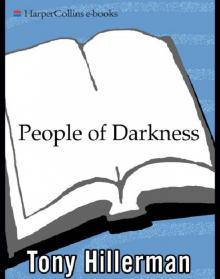 People of Darkness
People of Darkness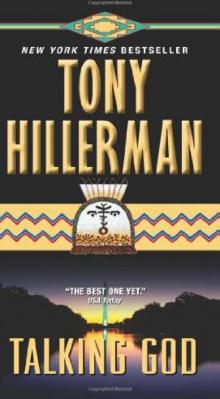 Talking God jlajc-9
Talking God jlajc-9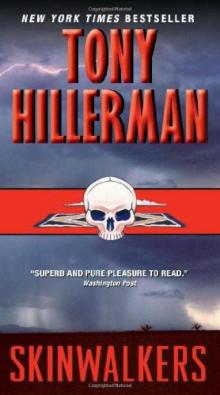 Skinwalkers jlajc-7
Skinwalkers jlajc-7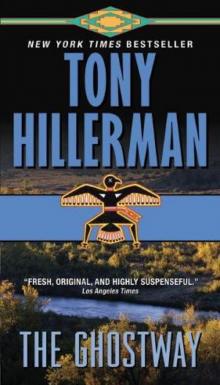 The Ghostway jlajc-6
The Ghostway jlajc-6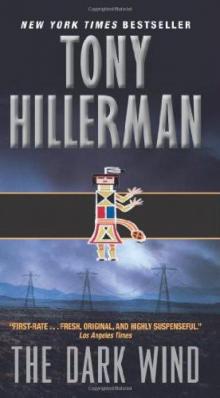 The Dark Wind jlajc-5
The Dark Wind jlajc-5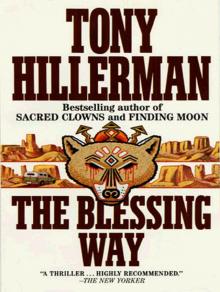 The Blessing Way
The Blessing Way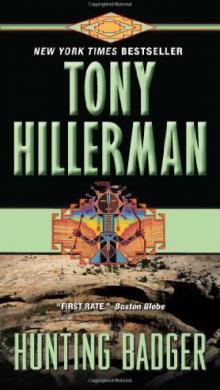 Hunting Badger jlajc-14
Hunting Badger jlajc-14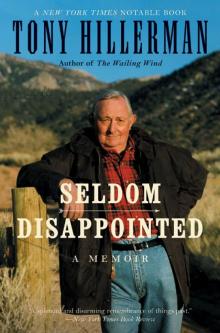 Seldom Disappointed: A Memoir
Seldom Disappointed: A Memoir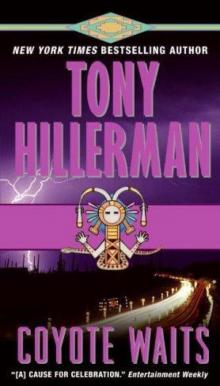 Coyote Waits jlajc-10
Coyote Waits jlajc-10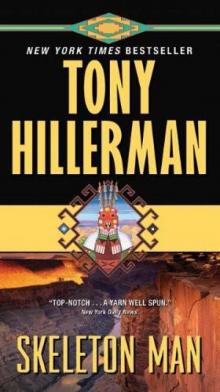 Skeleton Man jlajc-17
Skeleton Man jlajc-17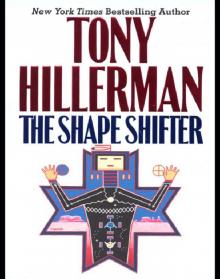 The Shape Shifter
The Shape Shifter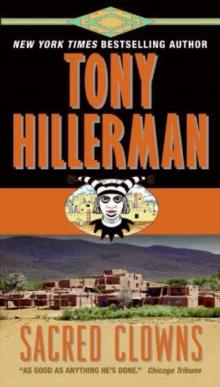 Sacred Clowns jlajc-11
Sacred Clowns jlajc-11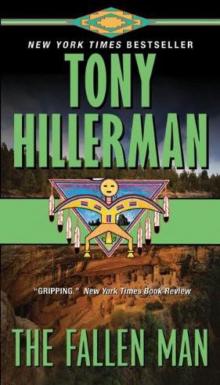 The Fallen Man jlajc-12
The Fallen Man jlajc-12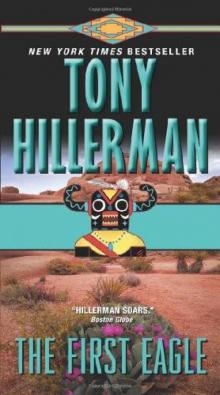 The First Eagle jlajc-13
The First Eagle jlajc-13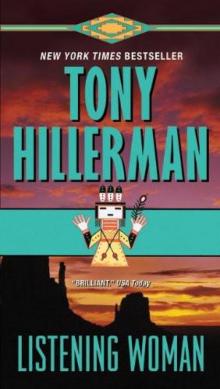 Listening Woman jlajc-3
Listening Woman jlajc-3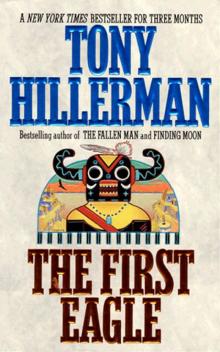 The First Eagle
The First Eagle Skeleton Man
Skeleton Man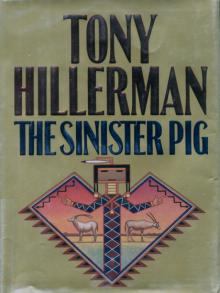 The Sinister Pig jlajc-16
The Sinister Pig jlajc-16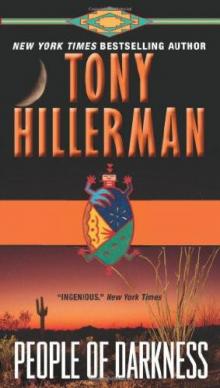 People of Darkness jlajc-4
People of Darkness jlajc-4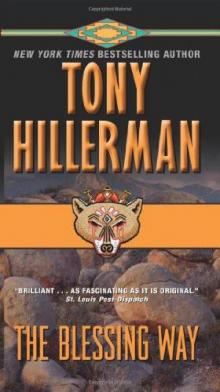 The Blessing Way jlajc-1
The Blessing Way jlajc-1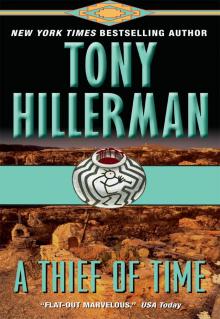 A Thief of Time
A Thief of Time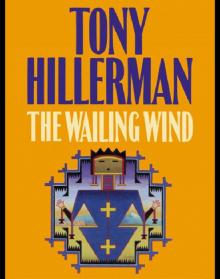 The Wailing Wind
The Wailing Wind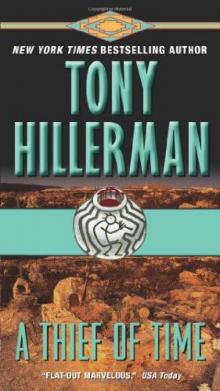 A Thief of Time jlajc-8
A Thief of Time jlajc-8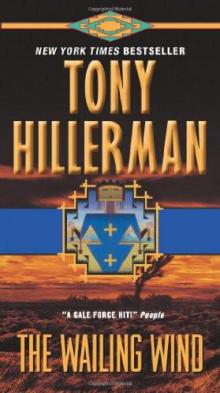 The Wailing Wind jlajc-15
The Wailing Wind jlajc-15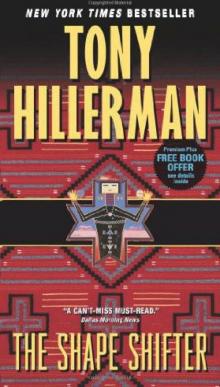 The Shape Shifter jlajc-18
The Shape Shifter jlajc-18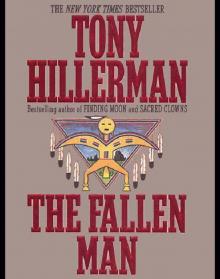 The Fallen Man
The Fallen Man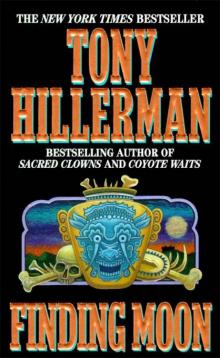 Finding Moon
Finding Moon